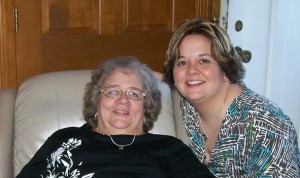Editor’s Note: This is another installment in our “Single and…” series where we will interview singles from all walks of life. It is our hope that you are encouraged by the stories of people who have a similar journey as you, who share the same dreams you have, who face the same hurdles you do, and who can remind you that you are not alone.
We understand that death is a part of living. As Christians, we trust in God’s faithfulness and His will, even when it’s desperately painful. Many of us don’t like thinking about the inevitable, though–that one day, we’ll have to help care for our parents and eventually bury them–mainly because we think it is a distant reality and not something we have to deal with at the moment.

But that isn’t the case for all singles. For some of us, caring for aging or ill parents is a very real and present reality. Losing a parent is hard no matter what age and despite marital status. It sucks, plain and simple. So how do you handle losing a parent when you are young and single–when you don’t have a spouse to help you process and grieve, when the struggle with loneliness could become even greater?
SaraBeth Fentress knows this struggle all to well. Nearly 4 years ago she lost her mother to cancer. How did she process this as a thirtysomething single? Here’s her story:
Could you tell us a little bit about your journey with your mother’s illness?
SaraBeth: My head rarely overrules my heart. I really did not think twice about my decision to pack up my life at the drop of a hat after my mom’s second round of chemotherapy proved unsuccessful. We heard the most dreaded words that a doctor can ever say: “There is nothing more that we can do. Our goal now is to make you as comfortable as possible for the time you have left.” My mother was diagnosed with Leiomyosarcoma (LMS) in October of 2010. LMS is a very rare and aggressive cancer. It is estimated that only four out of every million people will ever battle this dreadful strand of sarcoma. She went into hospice in July of 2011 and was given 6 months to live. Six weeks later, she passed away. My father, my sister, and I were her primary caregivers during her short period of time in hospice care. Looking back, this time was priceless for our family.
I watched my mother’s faith strengthen through an unimaginable trial. I watched her battle with her reality and eventually come to peace with the end of her earthly life. I will never forget the morning that I overheard mom singing, “Great is they Faithfulness” along with Bill Gaither on the television. What? Most of us would have been well into our pity party at this point in the story. I couldn’t believe what I was hearing. “Strength for today, bright hope for tomorrow, blessings all mine, with ten thousand beside.”
Considering how difficult that season in your life was, do you think your singleness made it less or more complicated?
SaraBeth: Can my answer be yes to both? Just look at the title of this blog post: “Single…and losing a parent.” Some people would consider these two of the worst double whammies someone could be dealt in life. If you could have interviewed my 15-year-old self, and you had asked her to name 5 of the worst possible scenarios for her life at age 35, these would have been 2 of the 5. This is certainly not how I would have written my story. However, I have learned to trust God’s plan for my life even when I do not understand what He is doing—even if it does not look like I would have chosen. I see God’s hand in my singleness through this unbearable trial. I was free to pack up my car and move home to be with mom in an instant. I did not have family responsibilities, time restrictions, or financial obligations to care for anyone else other than myself during that time. I would not trade one second of those last six weeks for anything in the world.
Yet, the negatives to being single through a trial of this magnitude are numerous as well. I needed someone to help me truly process my grief. I needed someone to own the responsibility of listening to me talk about my mom. Who would fill the gaping holes that she left during the holidays? Who could distract me from my inward focus? Who could share the burden with me? I have the best friends and family imaginable, but a nuclear family would have definitely made the grieving process different. I will even go as far as to say they would have made the process easier.
How were you able to find joy in the midst of suffering?
SaraBeth: In the years leading up to the death of my mother, God had been teaching me a lesson: You have to FIGHT FOR JOY. There is so much confusion in our society between happiness and joy. Happiness, for the most part, comes when we are content and our expectations are being met. Satan wants nothing more than to keep you from God’s best. He comes to steal, kill, and destroy—and ironically enough, sometimes he uses happiness to do that. We get so comfortable in the ease of life that often we miss God’s invitation for more. Times alone with God and in His word are essential in this fight for JOY. There is a battle going on, and we have to be prepared to be the warrior that God has created us to be. True JOY usually does not come without a fight.
Joy often comes with two unexpected companions, brokenness and surrender. Isn’t this the total opposite of what we would choose if we were the ones writing the story? My choice companions to joy would be celebration and peace, not brokenness and surrender. Do you see it? We must EMBRACE BROKENNESS in order to find the JOY of the Lord. Brokenness is not to be avoided or feared. We have been crucified with Christ (this is painful) but Christ now lives in us (this is JOYFUL). Hebrews 12:2 says, “Jesus, who for the JOY that was set before Him, endured the cross.” Enduring the cross = PAINFUL. Expectation of heaven = JOYFUL. Finding joy in the midst of unbearable circumstances is not easy, but it is definitely possible.

What are some of the ways people ministered to you specifically that were especially meaningful?
SaraBeth: There were so many examples of the Christian community serving my family during my mother’s illness and death. Most of my closest friends lived in different states during this time. People came to visit, cooked meals, and committed to pray for us. Two friends drove from Georgia to come to my mom’s visitation. I was not expecting to see them: They drove six hours, stayed to visit for two hours, and got back in their car and drove six hours home. Many friends came from out of state to go to the funeral. Friends cooked meals, came to visit, made me get out of the house, sat with me, cried with me, asked me hard questions, stayed with me in the hospital, and even sent my mom cards even though they had never met her. My family never felt alone during this time.
If someone is single and helping to care for an ill parent, what advice would you give them?
SaraBeth: Cherish every minute that you have. Be willing to have hard conversations. Make sure you say everything you need to say. Live with no regrets. There is always good in the midst of hard—you just have to look for it. Look for it. Give yourself grace. You have signed up for a marathon, not a sprint. It is ok to feel a myriad of emotions, even simultaneously.
Try to focus on who God is and what you know to be true of his character—not always on your feelings. Actually, this is advice that I would give anyone under any circumstance. Our life will be full of challenging times. These are the times when we are being refined. These are the times when God is preparing us for something. These are the times when we are being shaped more into the image of Christ.
If you know someone who has lost a parent or is caring for an ill parent, will you email them this post to encourage them?